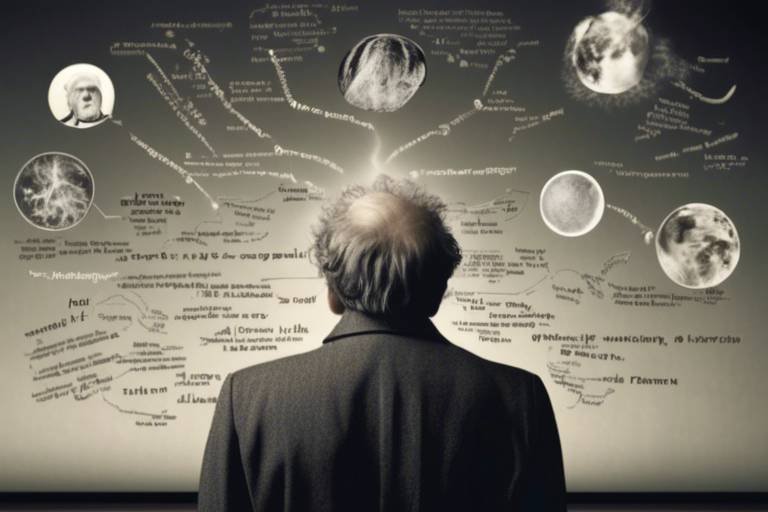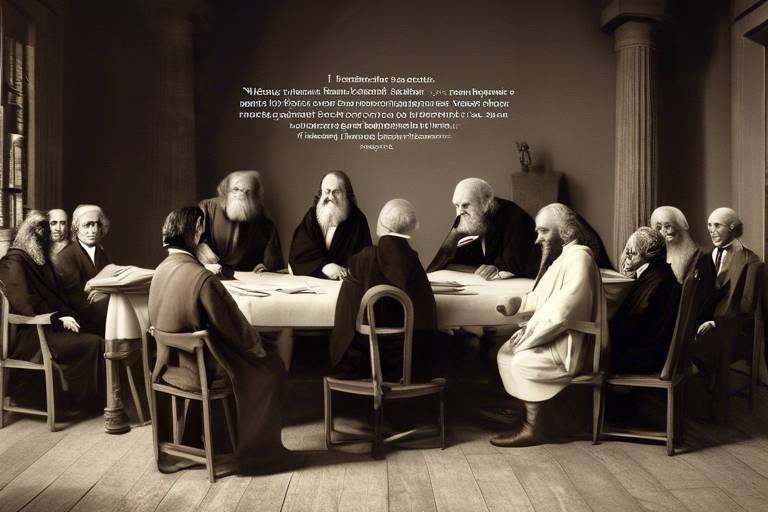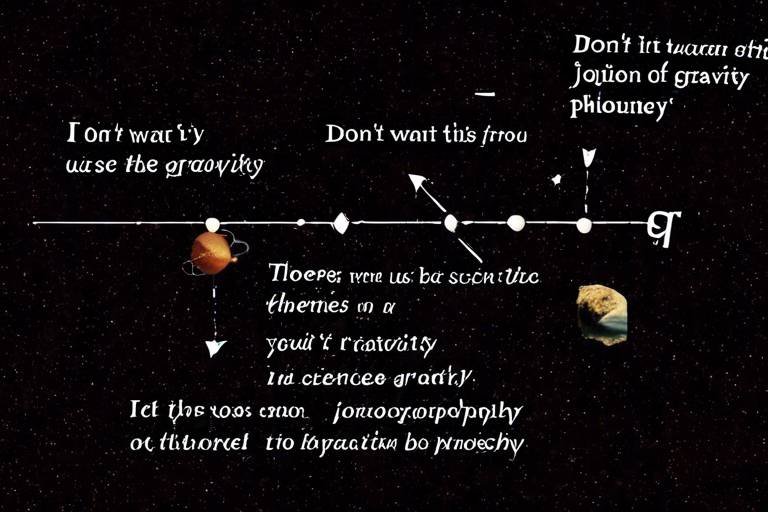Can Philosophy Answer Questions that Science Can't?
In a world where science reigns supreme, we often find ourselves grappling with questions that seem to slip through the cracks of empirical investigation. While science has provided us with incredible advancements and a deeper understanding of the universe, there are still profound inquiries that remain unanswered. This article delves into the fascinating intersection of philosophy and science, exploring the unique questions that philosophy addresses, which science cannot fully grasp. Are you ready to embark on a journey that challenges our perceptions of knowledge and existence? Let’s dive in!
Science is like a powerful flashlight, illuminating the dark corners of our understanding with its empirical methods. However, this flashlight has its limitations. For instance, it can shine brightly on the mechanics of the universe but struggles to illuminate the murky waters of moral dilemmas and existential questions. Consider this: can science tell us what is right or wrong? Can it provide a definitive answer to the meaning of life? The answer is a resounding no. This is where philosophy steps in, offering a lens through which we can explore these complex issues. Without philosophical inquiry, we risk losing sight of the broader implications of our scientific discoveries.
Some questions are so deeply woven into the fabric of human experience that they elude empirical testing. Think about questions of meaning, purpose, and identity. These are not just abstract concepts; they are central to our understanding of what it means to be human. Philosophy provides a framework for exploring these inquiries, allowing us to ponder the “why” behind our existence. Without this philosophical lens, our understanding of the universe would be incomplete, akin to reading a book with half of the pages missing.
When it comes to ethics, we find ourselves at a crossroads where science falls short. Science can tell us how things work, but it cannot dictate how we should behave. This is where moral philosophy comes into play. Ethical theories, such as utilitarianism and deontology, challenge us to consider the implications of our actions. They help us navigate the murky waters of right and wrong, providing guidance in a world that often feels chaotic. Without these philosophical frameworks, we might find ourselves adrift, lacking a moral compass in our decision-making processes.
To illustrate the divergence in ethical thought, let’s compare two major ethical theories: utilitarianism and deontology. Utilitarianism emphasizes the outcomes of our actions, suggesting that the best action is the one that maximizes overall happiness. On the other hand, deontology focuses on the inherent morality of actions themselves, arguing that certain duties must be upheld regardless of the consequences. Both frameworks contribute significantly to our understanding of morality, but they approach ethical dilemmas from fundamentally different angles. Understanding these differences is crucial in navigating the ethical landscape of our lives.
Another fascinating perspective in moral philosophy is virtue ethics, which centers on the character of the moral agent rather than the consequences of actions or adherence to rules. This approach encourages us to cultivate virtues such as honesty, courage, and compassion. In many ways, virtue ethics complements scientific approaches to human behavior, offering insights into the motivations behind our actions. By focusing on character, we gain a deeper understanding of the human experience, enriching our moral landscape.
Philosophy also tackles the big existential questions that science often overlooks. What does it mean to exist? What is identity? What is consciousness? These inquiries are not easily quantifiable, yet they are essential for understanding the human condition. By engaging with these philosophical questions, we can explore the depths of our existence and the nature of our reality, providing a richer context for our scientific understanding.
Metaphysics, the branch of philosophy concerned with the fundamental nature of reality, addresses questions that science cannot fully answer. While science can describe the mechanics of the universe, it often leaves us pondering the 'why' behind existence. Metaphysical inquiry helps us navigate these profound questions, shaping our understanding of reality and our place within it.
Ontology, a key area of metaphysics, delves into the nature of being and existence itself. It challenges scientific perspectives by asking questions like, “What does it mean to exist?” and “What is the nature of reality?” These ontological inquiries push the boundaries of scientific understanding and invite us to consider deeper philosophical implications.
Finally, philosophical cosmology explores the nature and origin of the universe, enriching scientific cosmology with perspectives that might otherwise be overlooked. Questions about existence, purpose, and the nature of the cosmos invite philosophical reflection, allowing us to weave together scientific knowledge and philosophical insight. This interplay can lead to a more comprehensive understanding of the universe and our place within it.
- Can philosophy and science coexist? Yes, they can complement each other by addressing different types of questions.
- What are some examples of philosophical questions? Examples include inquiries about morality, existence, and the nature of consciousness.
- Why is ethical theory important? Ethical theories provide frameworks for understanding moral dilemmas and guiding our actions.

The Limits of Scientific Inquiry
Science is an incredible tool that helps us unravel the mysteries of the universe. It thrives on empirical evidence, rigorous experimentation, and observable phenomena. However, despite its impressive capabilities, science has its limitations. There are realms of human experience and understanding that remain just out of reach, areas where the scientific method falters. For instance, consider the profound questions surrounding morality and ethics. Can a scientific experiment definitively tell us what is right or wrong? The answer is a resounding no. Science can inform us about the consequences of our actions, but it cannot dictate the moral framework within which we make our choices.
Moreover, science is fundamentally about the "how" of the universe. It seeks to explain processes and mechanisms, but it often leaves the "why" unanswered. Questions about purpose, meaning, and existence are deeply philosophical in nature. For example, why do we seek happiness? What is the purpose of life? These questions cannot be quantified or measured in a lab, yet they are essential to our understanding of the human condition. This gap between what science can explain and what we yearn to know highlights the necessity for philosophical exploration.
Additionally, there are complex emotional and existential dilemmas that science struggles to address. Take, for instance, the experience of grief. While science can study the physiological effects of loss, it cannot capture the profound emotional and existential crises that often accompany it. The subjective nature of human experience means that some aspects of our lives are simply beyond the reach of empirical investigation. This is where philosophy steps in, offering frameworks that help us navigate these murky waters.
In summary, while science provides invaluable insights into the workings of the universe, it is not equipped to answer all our questions. The interplay between science and philosophy is crucial, as it allows us to explore the deeper meanings and ethical implications of our existence. Understanding the limits of scientific inquiry not only enriches our comprehension of the world but also emphasizes the importance of philosophical thought in grappling with the complexities of life.
- What are the main limitations of scientific inquiry?
Scientific inquiry is limited in addressing subjective experiences, moral questions, and existential dilemmas that cannot be empirically tested.
- Can philosophy and science coexist?
Absolutely! Philosophy provides the ethical and existential context that complements scientific findings, enriching our overall understanding.
- How does philosophy address moral dilemmas?
Philosophy offers various ethical frameworks that help us navigate moral dilemmas, whereas science can inform us about the consequences of our actions.

Philosophical Questions Beyond Empiricism
When we think about the universe, our existence, and the meaning of life, we often find ourselves grappling with questions that simply can't be answered through empirical methods. Science, with its rigorous methodologies and reliance on observable data, excels at answering questions that can be tested and measured. But what about the big questions that linger in the back of our minds? Questions about meaning, purpose, and the very essence of our existence? These are the realms where philosophy shines, illuminating paths that science, for all its brilliance, cannot tread.
Consider this: while science can tell us how the brain functions and what chemical reactions occur when we feel love, it can't truly explain what love means or why it matters. This is where philosophical inquiry steps in, providing a framework to explore these profound concepts. The questions that philosophy addresses often delve into the subjective experiences and values that shape our lives, and these inquiries are essential for a comprehensive understanding of the human experience.
Philosophy invites us to ponder questions like:
- What is the meaning of life?
- Is there a purpose to our existence?
- What does it mean to be truly happy?
These questions may not have definitive answers, but they encourage deep reflection and discussion, allowing us to explore different perspectives and beliefs. Moreover, these philosophical inquiries can lead to a greater understanding of ourselves and our place in the universe.
Another fascinating aspect of philosophical questions is their ability to challenge our assumptions and provoke critical thinking. For instance, when we ask, "What is reality?" we open the door to discussions about perception, consciousness, and the nature of existence itself. Such inquiries can lead us to consider various philosophical theories, such as idealism—the belief that reality is mentally constructed—or realism, which posits that the world exists independently of our thoughts. These discussions can enrich our understanding of both philosophy and science, as they encourage us to question the very foundations of our knowledge.
Furthermore, philosophical questions often intersect with ethical considerations, leading us to explore not only what we know but also how we should act based on that knowledge. For example, the question of whether artificial intelligence can possess consciousness raises ethical dilemmas about the treatment of AI and the implications for our understanding of sentience. Here, philosophy serves as a vital tool for navigating the complexities of modern technological advancements.
In essence, philosophical questions beyond empiricism invite us to explore the profound mysteries of existence and our place within it. They challenge us to think critically, embrace uncertainty, and engage in meaningful dialogue about the nature of reality, morality, and the human experience. While science provides invaluable insights into the workings of the universe, philosophy enriches our understanding by addressing the questions that lie beyond the reach of empirical investigation.

Ethics and Moral Philosophy
When we dive into the realm of , we find ourselves grappling with some of the most profound questions that humanity has ever faced. What does it mean to do the right thing? How do we determine what is morally acceptable? While science provides us with data and facts, it often falls short in offering the moral compass needed to navigate complex human dilemmas. This is where philosophy steps in—like a guiding light in a foggy landscape, illuminating paths that science alone cannot traverse.
At its core, ethics is about understanding the principles that govern our behavior. It challenges us to think critically about our actions and their implications. For instance, consider the question of whether lying can ever be justified. A scientific approach might focus on the outcomes of lying—perhaps it leads to a temporary relief or avoids conflict. However, a philosophical perspective digs deeper, asking whether the act of lying itself undermines trust and integrity. This highlights a crucial distinction: while science can inform us about the consequences of our actions, it cannot dictate the moral weight of those actions.
To further illustrate the complexity of moral philosophy, let's examine two dominant ethical theories: utilitarianism and deontology. Utilitarianism, championed by thinkers like Jeremy Bentham and John Stuart Mill, posits that the morality of an action is determined by its outcomes—essentially, the greatest good for the greatest number. In contrast, deontology, rooted in the works of Immanuel Kant, emphasizes duties and rules, arguing that certain actions are inherently right or wrong, regardless of their consequences. This dichotomy raises essential questions about how we approach moral decision-making:
| Ethical Theory | Focus | Key Thinkers |
|---|---|---|
| Utilitarianism | Outcomes and consequences | Jeremy Bentham, John Stuart Mill |
| Deontology | Duties and rules | Immanuel Kant |
These frameworks not only shape our understanding of morality but also influence how we make decisions in everyday life. Should we lie to protect someone's feelings? A utilitarian might argue yes, if it spares pain, while a deontologist would likely insist that honesty is a duty, regardless of the emotional fallout. This tug-of-war between ethics and empirical evidence underscores the necessity of philosophical inquiry in our lives.
Moreover, the discussion of ethics extends beyond theoretical debates; it has real-world implications. For instance, consider the ethical dilemmas faced by medical professionals. They often encounter situations where they must weigh the benefits of a treatment against potential harm. Here, ethical theories provide a framework for navigating these tough choices, illustrating how philosophy can enhance our understanding of morality in practical scenarios.
In conclusion, while science excels at answering questions about the how of the universe, philosophy invites us to ponder the why. By exploring ethical theories and moral philosophy, we gain insights that help us navigate the murky waters of human behavior and decision-making. Ultimately, the interplay between ethics and science enriches our understanding of the world, reminding us that some questions are best answered not through data alone, but through critical reflection and philosophical discourse.
- What is the difference between ethics and morality? Ethics refers to the systematic study of what is right and wrong, while morality encompasses the actual beliefs and practices that individuals hold regarding right and wrong.
- Can science inform ethical decision-making? Yes, science can provide data that informs ethical decisions, but it cannot dictate what is morally right or wrong.
- Why is philosophy important in understanding ethics? Philosophy encourages critical thinking and reflection on moral issues, providing frameworks that help us navigate complex ethical dilemmas.

Utilitarianism vs. Deontology
When it comes to ethical decision-making, two of the most prominent theories that often come into play are utilitarianism and deontology. These frameworks offer distinct perspectives on how we should evaluate our actions and their consequences. Utilitarianism, championed by philosophers like Jeremy Bentham and John Stuart Mill, suggests that the morality of an action is determined by its outcomes. In other words, if an action leads to the greatest good for the greatest number of people, then it is deemed morally right. This consequentialist approach is straightforward and appeals to our intuitive sense of maximizing happiness. But does that mean it's the best ethical framework? Not necessarily.
On the other hand, we have deontology, a theory largely associated with Immanuel Kant. Deontology posits that the morality of an action is based on whether it adheres to a set of rules or duties, regardless of the consequences. For deontologists, certain actions are inherently right or wrong, and we have a moral obligation to follow these principles. Imagine you're faced with a scenario where lying could save a life. A utilitarian might argue that lying is acceptable, as it produces a better outcome. In contrast, a deontologist would assert that lying is inherently wrong, no matter the potential benefits.
To illustrate the differences between these two ethical frameworks, let's consider a simple table:
| Criteria | Utilitarianism | Deontology |
|---|---|---|
| Focus | Consequences of actions | Adherence to rules and duties |
| Moral Evaluation | Greatest good for the greatest number | Inherent rightness or wrongness of actions |
| Example Scenario | Lying to save a life is acceptable | Lying is always wrong, regardless of the outcome |
Both theories have their strengths and weaknesses. Utilitarianism is often criticized for justifying actions that may seem morally questionable if they lead to positive outcomes. For instance, sacrificing one life to save many can lead to a slippery slope where individual rights are overlooked. Conversely, deontology can be seen as inflexible, as it may lead to morally questionable outcomes by rigidly adhering to rules. For example, sticking to the duty of telling the truth could result in harm, even if a lie could prevent it.
In practice, many people find themselves navigating a middle ground between these two theories. They may agree that while outcomes are important, there are certain moral principles that should not be violated under any circumstances. This blending of perspectives can lead to a more nuanced understanding of ethics, allowing individuals to consider both the consequences of their actions and their moral duties.
In summary, the debate between utilitarianism and deontology is not just an academic exercise; it has real-world implications that affect our daily lives. Whether we're making personal choices or public policy decisions, understanding these ethical frameworks can help us navigate the complexities of morality in a way that is both thoughtful and responsible.
- What is utilitarianism? Utilitarianism is an ethical theory that suggests the best action is the one that maximizes overall happiness or utility.
- What is deontology? Deontology is an ethical framework that focuses on the adherence to rules and duties rather than the consequences of actions.
- Can you combine utilitarianism and deontology? Yes, many people find a balance between the two, considering both outcomes and moral duties in their decision-making.
- Which theory is better? There is no definitive answer; it often depends on the context and personal values of the individual making the decision.

Virtue Ethics and Character
When we think about ethics, our minds often jump to rules and consequences. However, virtue ethics takes a refreshing detour, focusing instead on the character of the moral agent rather than merely the actions they take or the outcomes of those actions. This approach posits that developing good character traits, or virtues, is essential for ethical living. Imagine a sculptor chiseling away at a block of marble; each tap of the chisel represents the cultivation of virtues like courage, honesty, and compassion, gradually revealing the masterpiece that is a well-rounded individual.
At its core, virtue ethics asks us to consider questions like: What kind of person do I want to be? This personal reflection encourages us to strive for moral excellence by embodying virtues that enhance not only our lives but also the lives of those around us. Unlike other ethical frameworks that may provide a rigid set of rules, virtue ethics emphasizes the importance of moral character and the development of habits that lead to virtuous living. In this way, it complements scientific approaches to understanding human behavior by adding a layer of depth that purely empirical methods often overlook.
To illustrate the significance of virtue ethics, let's consider a few key virtues and their implications:
- Courage: The ability to confront fear and take risks for the greater good.
- Honesty: Valuing truthfulness and transparency in all interactions.
- Compassion: The capacity to empathize with others and act in their best interests.
These virtues are not just abstract concepts; they are actionable qualities that can significantly influence our decisions and interactions. For instance, a courageous person may stand up against injustice, while a compassionate individual may dedicate their time to helping those in need. By fostering these virtues, we cultivate a character that naturally leads to ethical behavior, thus bridging the gap between philosophical inquiry and everyday life.
Moreover, virtue ethics recognizes that our moral development is a lifelong journey. Just as a tree needs nurturing to grow strong and bear fruit, our character requires continuous reflection and practice. This perspective encourages us to engage in self-improvement actively, seeking to refine our virtues through experiences and interactions with others. Therefore, virtue ethics not only enriches our understanding of morality but also empowers us to become better versions of ourselves.

Existential Questions and Human Experience
When we dive into the realm of existential questions, we are essentially probing the very fabric of our being. These inquiries often revolve around profound topics such as identity, purpose, and the nature of consciousness. While science has made remarkable strides in explaining the mechanics of the universe, it often leaves us hanging when it comes to understanding the essence of our existence. For instance, consider the question, "What does it mean to be human?" This is not a question that can be easily measured or quantified; rather, it invites a deeper exploration of our experiences, emotions, and the stories we tell ourselves.
Philosophy plays a crucial role in this exploration, offering frameworks that help us navigate the murky waters of human experience. It encourages us to reflect on questions that might seem trivial at first but hold profound implications for our lives. Questions like "Why are we here?" or "What is the nature of reality?" compel us to look beyond empirical evidence and tap into the rich tapestry of our thoughts and feelings. These inquiries can lead to a greater understanding of our motivations and the choices we make, shaping our identities and guiding our actions.
Moreover, the existential questions we face are not just individual concerns; they resonate within the collective human experience. For example, the quest for meaning often leads to diverse interpretations across cultures. Some may find solace in religious beliefs, while others may seek meaning through artistic expression or philosophical inquiry. This diversity illustrates how existential questions can foster a sense of community, as individuals share their perspectives and engage in dialogues that enrich their understanding of life.
To further illustrate the impact of existential questions on human experience, consider the following table that highlights key themes and their philosophical implications:
| Existential Theme | Philosophical Implication |
|---|---|
| Identity | Exploration of self and what defines us as individuals. |
| Purpose | Understanding our motivations and the significance of our actions. |
| Consciousness | Investigating the nature of awareness and the mind-body relationship. |
| Mortality | Contemplating the meaning of life and death and the legacy we leave behind. |
As we navigate these existential waters, it becomes increasingly clear that while science provides us with tools to understand the physical world, it is philosophy that helps us grapple with the deeper questions of existence. Just like a compass guiding us through a dense forest, philosophical inquiry illuminates the paths we might take in our quest for understanding. In doing so, it enriches our human experience, allowing us to confront the complexities of life with a sense of curiosity and wonder.
- What are existential questions? Existential questions are profound inquiries about the nature of existence, purpose, identity, and consciousness that challenge our understanding of life.
- How does philosophy help in understanding human experience? Philosophy provides frameworks and perspectives that allow us to explore complex issues beyond empirical evidence, enriching our understanding of human emotions and motivations.
- Can science answer existential questions? While science excels in empirical investigation, it often falls short in addressing the subjective and philosophical dimensions of existential questions.

The Role of Metaphysics
Metaphysics plays a crucial role in our understanding of reality, diving into the fundamental nature of existence that often eludes scientific inquiry. While science is grounded in empirical evidence, metaphysics explores the 'why' and 'what' of the universe, delving into concepts that can't be measured or observed directly. For instance, questions about the nature of time, space, and causality are not just scientific concerns; they are deeply philosophical. Metaphysics invites us to ponder whether time is linear or cyclical, whether space is a concrete entity or merely a relational concept, and what it truly means for one event to cause another.
One of the most fascinating aspects of metaphysics is its ability to address questions about existence that science cannot fully answer. Consider the question of why there is something rather than nothing. This inquiry transcends scientific explanation and nudges us towards philosophical contemplation. While science can describe how things came to be, it struggles to provide a satisfactory answer to the ultimate question of existence itself. Here, metaphysical inquiry becomes essential, as it encourages us to explore the implications of existence, non-existence, and the nature of being.
Moreover, metaphysics often intersects with other philosophical domains, such as epistemology (the study of knowledge) and ethics. For instance, the metaphysical underpinnings of what it means to know something can profoundly influence our ethical frameworks. If we consider knowledge as a construct rather than an absolute truth, we might approach moral dilemmas with a more nuanced perspective. This interplay between metaphysics and other philosophical disciplines enriches our understanding of complex issues, revealing the interconnectedness of various philosophical inquiries.
To illustrate the importance of metaphysical questions, we can look at some key areas of exploration:
- Ontology: The study of being and existence, questioning what entities exist and how they can be categorized.
- Causality: Examining the nature of cause and effect, and whether causation is a fundamental aspect of reality.
- Identity: Investigating what it means for something to be the same over time, and how identity relates to change.
- Possibility: Exploring the nature of possible worlds and what it means for something to exist in a potential state.
In conclusion, metaphysics is not merely an abstract discipline; it is a vital part of our quest for understanding. By probing questions that lie beyond empirical reach, metaphysics enriches our comprehension of existence, reality, and the universe at large. It encourages us to think critically and expansively, inspiring a deeper appreciation for the mysteries of life that science alone cannot unravel.
- What is metaphysics? Metaphysics is a branch of philosophy that studies the fundamental nature of reality, including concepts like existence, being, and the universe.
- How does metaphysics differ from science? While science relies on empirical evidence and observable phenomena, metaphysics explores questions that cannot be tested or measured directly.
- Why are metaphysical questions important? Metaphysical questions encourage critical thinking and provide insights into the nature of existence, which can enhance our understanding of various philosophical and ethical issues.

Ontology and the Nature of Being
Ontology, a core branch of metaphysics, dives deep into the **nature of being** and existence itself. It poses some of the most profound questions that challenge our understanding of reality. What does it mean to exist? Are there different modes of being? These inquiries not only provoke thought but also reveal the limitations of scientific inquiry when it comes to understanding existence. While science can measure and observe the physical universe, ontology dares to ask the **why** behind existence, pushing us to consider the essence of what it means to be.
Consider for a moment the difference between saying "I exist" and "I am." The first statement is a simple acknowledgment of presence, often taken for granted. However, the second statement delves into a deeper philosophical exploration of identity and consciousness. Ontological questions challenge us to reflect on our own existence and the nature of reality. For example, they prompt us to think about:
- What constitutes reality? Is it merely what we can perceive, or is there more?
- Do abstract concepts, like numbers or emotions, have a form of existence?
- How do we differentiate between what is real and what is merely a product of our imagination?
These questions lead us into a rich tapestry of philosophical discourse. Ontologists explore various categories of being, such as concrete versus abstract entities, and they investigate the relationships between different forms of existence. Through this exploration, we begin to understand that being is not just a static state but a dynamic interplay of various factors, including time, space, and consciousness.
Moreover, ontology challenges the scientific perspective by introducing concepts such as **potentiality** and **actuality**. For instance, Aristotle's distinction between these two states provides a framework for understanding how entities can exist in potential forms before they manifest in reality. This notion raises intriguing questions about the nature of existence itself. Is everything that exists in a state of becoming? Or are there immutable truths that exist independently of our perception?
In examining the nature of being, ontological inquiries also intersect with other philosophical disciplines, such as epistemology and ethics. For example, understanding what it means to be can influence our ethical frameworks. If we recognize the interconnectedness of all beings, it may lead to a more compassionate and holistic approach to moral philosophy.
Ultimately, ontology serves as a vital bridge between philosophy and science, inviting us to ponder the **fundamental nature of reality**. While science provides us with tools to explore and understand the physical world, ontology enriches our understanding by addressing the deeper questions that lie beneath the surface. It reminds us that the quest for knowledge is not solely about empirical data but also about the profound mysteries of existence that continue to elude definitive answers.
- What is ontology? Ontology is the branch of metaphysics that studies the nature of being, existence, and the categories of being.
- How does ontology differ from science? While science focuses on empirical investigation and observable phenomena, ontology addresses the fundamental questions of existence that often cannot be measured or observed.
- Why are ontological questions important? Ontological questions help us explore our understanding of reality, identity, and the nature of existence, enriching our philosophical and ethical perspectives.

Cosmology and the Philosophical Implications
When we gaze up at the night sky, we are often left in awe of the vastness and complexity of the universe. Cosmology, the scientific study of the universe's origin, evolution, and eventual fate, provides us with a framework to understand celestial phenomena. However, while science offers invaluable insights into the workings of the cosmos, it often leaves us with profound questions that transcend empirical observation. This is where philosophy steps in, illuminating the shadows that science alone cannot reach.
One of the most captivating philosophical implications of cosmology is the question of existence itself. Why is there something rather than nothing? This inquiry challenges both scientists and philosophers, as it delves into the very fabric of reality. Theories like the Big Bang provide a scientific narrative for the universe's beginning, yet they do not address the underlying reasons for that beginning. Philosophical discussions surrounding this topic often explore concepts of causality and necessity, pushing us to consider whether the universe is a product of chance, design, or something entirely different. Such discussions can lead to a rich tapestry of ideas, including:
- The nature of time and whether it is linear or cyclical.
- The possibility of multiple universes and what that means for our understanding of reality.
- The implications of a universe that may be infinite or finite.
Furthermore, cosmology raises questions about our place within the universe. Are we mere observers, or do we have a role in the cosmic narrative? This leads to existential reflections on human significance and the notion of anthropic principles, which suggest that the universe's laws are fine-tuned for the emergence of life. Such philosophical inquiries compel us to consider the implications of our existence and the responsibilities that come with it. Are we here by accident, or is there a greater purpose? These questions often lead to a deeper exploration of meaning and value in our lives, which science, with its focus on objective data, cannot adequately address.
Moreover, the interplay between cosmology and philosophy extends to the ethical implications of our understanding of the universe. As we uncover the mysteries of the cosmos, we must grapple with the responsibilities that arise from our newfound knowledge. For instance, advancements in space exploration and the potential colonization of other planets prompt ethical considerations about our impact on these environments and the life forms that may exist there. Should we impose our presence on other worlds, or should we adopt a more humble approach, acknowledging our place within a broader cosmic community?
In summary, while cosmology provides a scientific foundation for understanding the universe, it is philosophy that enriches this understanding by probing the deeper questions of existence, meaning, and ethics. The two disciplines, when intertwined, create a more comprehensive view of our reality, inviting us to reflect on our place in the cosmos and the implications of our actions. As we continue to explore the universe, the philosophical implications of cosmology will undoubtedly challenge us to think critically about our existence and the nature of reality itself.
- What is cosmology? Cosmology is the scientific study of the universe's origins, structure, evolution, and ultimate fate.
- How does philosophy relate to cosmology? Philosophy addresses questions about existence, meaning, and ethics that science alone cannot fully answer.
- What are anthropic principles? These principles suggest that the universe's laws are fine-tuned for the emergence of life, raising questions about our significance in the cosmos.
- Why are ethical considerations important in cosmology? As we explore the universe, we must consider the implications of our actions on other environments and potential life forms.
Frequently Asked Questions
- What are the main limitations of scientific inquiry?
Science is fantastic at answering questions through empirical investigation, but it hits a wall when it comes to moral dilemmas and existential queries. For instance, while science can tell us how the universe works, it can't tell us why we're here or what gives life meaning. That's where philosophy steps in, tackling those deep questions that leave scientists scratching their heads.
- Why are philosophical questions important?
Philosophical questions are crucial because they delve into the aspects of human experience that science can't quantify. Think about it: questions about purpose and meaning shape our lives and influence our decisions. Without philosophy, we might find ourselves lost in a sea of facts without understanding their significance.
- How do ethics relate to philosophy and science?
Ethics is a branch of philosophy that deals with questions of right and wrong. While science can provide data, it can't dictate moral values. For example, should we prioritize the greatest good for the greatest number (utilitarianism) or adhere to strict moral rules (deontology)? These are ethical dilemmas where philosophy plays a pivotal role in guiding our moral compass.
- What is the role of metaphysics in philosophy?
Metaphysics dives into the fundamental nature of reality, tackling questions that science often overlooks. It explores what it means to exist and the essence of being. While science can describe phenomena, metaphysics asks why those phenomena exist in the first place, offering a richer understanding of the universe.
- Can philosophy enhance scientific understanding?
Absolutely! Philosophy can provide a framework for interpreting scientific findings. For instance, philosophical cosmology examines the origins of the universe, asking questions about existence that go beyond mere scientific data. By integrating philosophical perspectives, we can gain a deeper appreciation of scientific discoveries.
- What is the difference between utilitarianism and deontology?
Utilitarianism is all about outcomes—it's the idea that the best action is the one that maximizes happiness. On the other hand, deontology focuses on duties and rules, arguing that some actions are inherently right or wrong, regardless of their consequences. These two ethical theories provide different lenses through which to view moral dilemmas.
- How does virtue ethics differ from other ethical theories?
Virtue ethics emphasizes character and the importance of virtues rather than strict rules or outcomes. It asks, "What kind of person should I be?" instead of simply "What should I do?" This approach complements scientific perspectives on human behavior by focusing on the moral agent's character rather than just the actions themselves.
- What existential questions does philosophy address?
Philosophy tackles profound existential questions about existence, identity, and consciousness. These inquiries probe into what it means to be human and how we understand ourselves in the context of the universe. While science provides insights into the mechanics of life, philosophy seeks to understand the essence of life itself.
- What is ontology in relation to metaphysics?
Ontology is a branch of metaphysics that focuses on the nature of being and existence. It challenges scientific perspectives by asking what it really means to exist. While science might classify entities, ontology digs deeper, questioning the very nature of those classifications and what they imply about reality.
- How do philosophical perspectives contribute to cosmology?
Philosophical perspectives enrich scientific cosmology by addressing questions about the universe's nature and origin that science alone may not fully answer. For example, philosophical discussions can explore the implications of the Big Bang theory or the concept of infinity, offering a more holistic view of our universe.



















